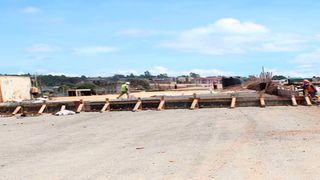
A section of the James Gichuru-Rironi road under construction on April 16. It will connect to the Rironi-Mau Summit highway whose construction is set to start later this year.
| File | Nation Media GroupNews
Premium
You’ll pay Sh6 per km to use the Rironi-Mau Summit road
What you need to know:
- For every kilometre on the highway, a motorist will part with Sh6 on any section of the road.
- Motorists will have the option of paying electronically or manually at the end of their journey.
Motorists will pay between Sh1,050 and Sh6,300 to drive on the Sh160 billion Rironi-Mau Summit dual carriageway, whose construction is expected to start in September.
For every kilometre on the highway, a motorist will part with Sh6 on any section of the road.
This translates to Sh1,050 for saloon cars and Sh6,300 for big trucks.
Digital toll stations will be built along the 175-kilometre stretch between Rironi and Mau Summit, and motorists will be charged depending on the size of the vehicle.
Motorists will have the option of paying electronically or manually at the end of their journey.
There will also be another 58 kilometres built as part of the 30-year project that will open up the highway that is a key link to western Kenya and Uganda.
The road will be built by the Rift Valley Highway Company.
Nairobi Expressway
This is a consortium comprising Meridian Infrastructure Africa Fund, Vinci Highways and Vinci Concessions, a French concessions and construction company.
The project will see the road expanded into a four-lane dual carriageway through a Public-Private Partnership (PPP) model and have users pay for its costs, as government turns to tolling as an alternative development financing model.
Already, the Nairobi Expressway is at an advanced stage and will see Kenyans pay to use it. The build-operate-transfer model is becoming popular for governments that do not want to borrow to finance infrastructure projects, but would rather transfer the risks to the private sector.
In the new project, Kenya will take on the demand and political risks, which means that the National Treasury will have to make provisions in case the country is not able to repay the money within the maximum allowable 30-year project life cycle.
Kenya National Highways Authority (Kenha) in a presentation to journalists on Wednesday revealed that smaller sized vehicles, which include saloon cars and personal vehicles, will be classified as one-passenger car unit (PCU), which means that they will only pay Sh6 for every kilometre travelled.
For the larger trucks, the PCUs will be as many as six which means that they will pay up to Sh36 per kilometre travelled.
National toll fund
But motorists who do not wish to pay will have alternative routes to use and there will also be discounts for frequent users.
Military vehicles and ambulances will be spared from the toll fees.
Kenha said construction will take about 3.5 years and the company building it will operate it for another 26.5 years before handing it over to the government, having repaid themselves through the toll fees.
All the money collected from the road will go to the national toll fund, from where the contractors will be paid what is known as availability payments.
This will see the operators evaluated on their ability to fix potholes and clear the road in case of accidents to make it available for users.
The road is one of the issues discussed by President Uhuru Kenyatta and his French counterpart Emmanuel Macron in Paris yesterday.
Enhanced cooperation
The morning meeting at Elysee Palace saw the two leaders discuss the Sh160 billion Rironi Mau Summit dual carriageway amongst several bilateral and multilateral subjects of mutual interest to Kenya and France.
“The two leaders discussed the progress of key France supported infrastructure projects in Kenya including the expansion of the 233-kilometer Rironi-Nakuru-Mau Summit Road,” a statement from the PSCU said.
The public-private partnership (PPP) agreement to expand the Northern Corridor road into a four-lane dual carriageway and reduce congestion was reached during President Kenyatta's visit to Paris in October last year.
Besides infrastructure, Presidents Kenyatta and Macron discussed enhanced cooperation in the health sector particularly in building Kenya's capacity to manufacture vaccines locally.
On the multilateral front, the two leaders spoke about the forthcoming Global Partnership for Education (GPE) Summit in London to be co-hosted by President Kenyatta and UK Prime Minister Boris Johnson.
“The summit is set for 28th and 29th this month, and aims at raising 5 billion USD in five years for investment in the education of 175 million children in low-income countries across the world,” a statement from the Presidential Strategic Communications Unit (PSCU) said.
President Kenyatta was accompanied to Elysee Palace by Foreign Affairs Cabinet Secretary Raychelle Omamo, her Infrastructure counterpart James Macharia and Kenya’s envoy to France Prof Judi Wakhungu.





